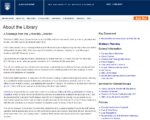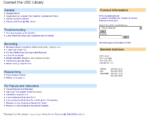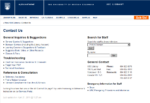I’m sure everyone has experienced it when they change jobs. Everyone has experienced the shift and the need to adjust to a new job, manager/supervisor, and organization. I think what’s really hit me is that I’ve gone from one end to the pendulum to the complete opposite (or so it seems).
Management
At my old job, I was basically given a one liner on what I should be doing, “go do x, and if you don’t know how, just read up on it and give it a go.” If I needed help though, my coworkers would be more than happy to. I used my time as I saw fit in working on projects, and attended workshops on campus.
Now, I get lots of detail on what is being asked of me. I also send everything to be vetted by my manager and sometimes other coworkers. I keep a list of everything I’m working on and completed as well. I ask permission to go to anything my manager hasn’t directly sent me to.
Organization
In general, yes, things were divided by units or departments, but we got good response time for the most part and had a fair amount of control over what we could do. It was fairly easy to contact people and find out what information you wanted or needed.
Now, things are not only divided, things sometimes frustrate me, because we get minimal to little support in some areas. I also find it difficult to get information, having to through unusual ways to get it frequently. Though I admit, I think a lot of it is having no control and being allowed to be given any. It’s irking especially to know that you could probably fix it yourself, but it’s not your job. Then again, it seems I’ve just been “lucky” to encounter a number of issues and it’s not that common for a lot of the little things to happen that have been bothering me. Don’t get me wrong, a lot of things do go very well. I have found people very helpful and willing to help, and IT help desk is great!
Conclusion
There is no better, just different and what fits better with your work style.
general, yes, things were divided by units or departments, but we got good response time for the most part and had a fair amount of control over what we could do. It was fairly easy to contact people and find out what information you wanted or needed.







